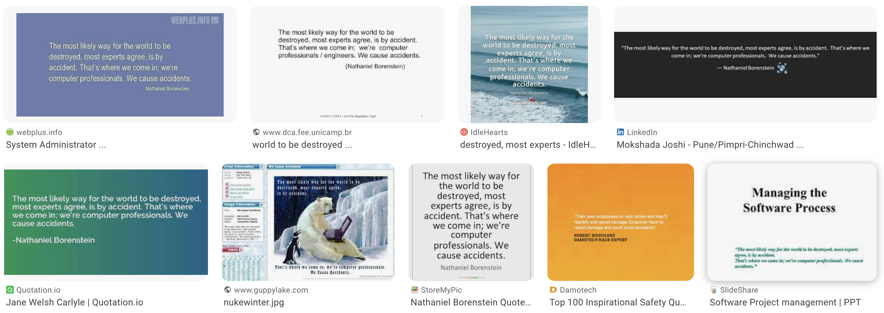

In the mid 1980's, I made an offhand joke while teaching an undergraduate Software Engineering class. One of my students wrote down and started it circulating, to the point where, in my nightmares, it adorns my gravestone. On the brighter side, it has provided me with customized tote bags and other swag:
"The most likely way for the world to be destroyed, most experts agree, is by accident. That's where we come in; we're computer professionals. We cause accidents."
For the record, that is not the only thing I have ever said. Some of my other favorites:
"...No ethically-trained software engineer would ever consent to write a DestroyBaghdad procedure. Basic professional ethics would instead require him to write a DestroyCity procedure, to which Baghdad could be given as a parameter." -- footnote in 1992 paper
"In the 1930's Gödel proved there are things that are true but cannot be proven. Within such areas of undecidability, beliefs that might be called religious, supernatural, crazy, or just plain hunches, are mostly harmless, and it is downright adaptive/intelligent to choose the most comforting believable hunch. The hard part happens when something previously believed to be in that undecidable zone is unlocked by a scientist like Darwin, when it can be very hard for people to accept that they had backed the wrong hunch. I think the Jesuits show that this can be done."
"For my part, I try to have blind faith in the best possible worldview that appears consistent with science. I choose to believe that the invisible frequencies of light are the most beautiful." -- Facebook comment, February, 2021
"There are four kinds of lies: Lies, Damn Lies, Statistics, and Visualizations" -- 2006 Internal IBM blog post (older form has murky origins.)
"People will pay any price for security, as long as it's free." -- inspired by discussions of the failure of email encryption
"The law of large numbers means that nearly all of us know of people both better and worse off than us. The choices are looking up with envy or looking down with compassion." -- Slack chat, July 10, 2020
"The question isn’t how to train people for nonexistent jobs, it’s how to share the wealth in a world where we don’t need most people to work." 2017, Mashable.com
"Spam is bad. The amazing degree of unanimity that greets such a simple declaration is, paradoxically, the biggest impediment to progress in anti-spam standards." -- 2004 presentation to NIST/FCC; redistributed by Andy Newton.
"Lawyers, like many primitive animals, have a deep-seated need to mark their territory." -- ?
"To believe in synchronicity is to believe in the ability of the universe, on rare occasions, to spontaneously generate goodness, beauty, and joy." -- ?
"All bits live forever, and all bits eventually become public." -- ?
"If I believed in God, I would admire His wisdom in making us mortal, and thus placing an upper bound on our destructiveness." -- ?
"The telephone, for those of you who have forgotten, was a commonly used communications technology in the days before electronic mail. They're still easy to find in most large cities." -- Origin uncertain, collected by Jim Mercer
"Reverence for all life is a vaccine against violence. Less meat, less war." --Written for thevegetariansite.com
"The Internet is truly an amazing thing -- it has unlocked human creativity to allow us to devise more bad ideas than previous generations ever imagined were possible." -- 2011 message to Dave Farber's "interesting people" mailing list.
"We all live in myths of our own creation, but are rarely sufficiently aware of this fact to choose our myths wisely." -- ? (via Bob Glickstine or Christine Hambridge?)
"[It's] interesting to think that if you have two vacation programs going in a situation where mail turnaround averages four days or more, they might indeed fall into a slow endless loop. Fortunately mail is rarely that slow, and unfortunately vacations are rarely long enough for this to be a real problem." -- ? (bobg)
"I believe we innovate because we are innately curious about the world and what we can do with it. The folks in finance believe we innovate to help the bottom line. Reasonable men can have different rationales, so they make coalitions, and knowledge workers get more freedom when they keep a good eye on the bottom line." -- Internal Mimecast email, 12/11/20
"Innovation is the natural byproduct of a clear human mind possessed of all the relevant facts and disciplines, and a conducive, nurturing environment for asking questions." Internal Mimecast email, 12/11/20
"The guy who invented train wheels and tracks did not anticipate Hitler." -- I don't remember saying this, but Lee Stein says I did.
"As more and more good ideas come under the protection of patents, it may become increasingly unlikely that any one program can incorporate the state of the art in user-interface design without sinking into a quagmire of unending royalty payments and legal battles." -- Programming As If People Mattered
"Software patents may be used as a form of outright coercion, providing protection against theft of ideas as a potentially high cost to future inventors." -- Programming As If People Mattered